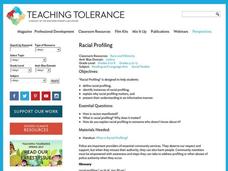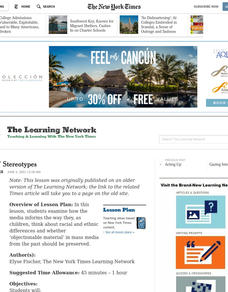Centers for Disease Control and Prevention
Major Disparities in Adult Cigarette Smoking Exist Among and Within Racial and Ethnic Groups
Data indicates that some racial groups smoke more than others, and that with that racial group, there are smaller groups whose smoking habits vary as well. Secondary learners read a graph that details the differences between the Asian...
Curated OER
Racial Tensions for Mixed Families
"Racial Tensions for Mixed Families" is the title of the New York Times article your class gets to read, if they click on this resource. They'll read the article then answer 10 comprehension questions.
Teaching Tolerance
Racial Profiling
Racial Profiling. Class members chart what they know and what they want to know about this hot-button topic.
Curated OER
Sufferin' Stereotypes
Examine how the media informs the way your class thinks about racial and ethnic differences. Additionally, middle and high schoolers discuss whether "objectionable material" in mass media from the past should be preserved.
PBS
Racial Equality: How Far Have We Come and How Far Do We Have To Go?
Is everyone treated fairly in America? The culminating fifth lesson from a series of five has pupils explore racial inequalities from the 1960s and decide whether or not society has changed over time. The lesson comes with a speech from...
Curated OER
For The Sake Of Security: U.S.A. Patriot Act & Bill of Rights
A substantive New York Times article about the U.S.A. Patriot Act, military tribunals, racial profiling, and the Bill of Rights forms the basis for a discussion of the complex interplay of fundamental American rights and the aftermath of...
Alabama Department of Archives and History
Two Different African-American Visions: W.E.B. Du Bois and Booker T. Washington
The strategies civil rights activists Booker T. Washington and W.E.B. Du Bois proposed for blacks to achieve racial progress is the focus of an activity in which class groups identify the strategies as well as the benefits and drawbacks...
Curated OER
Racial Profiling
Learners explore racial profiling. In this Teaching Tolerance lesson, students discover what racial profiling is and then teach their classmates what it is as they write a news report or opinion essay. Learners may also create a video or...
Anthropological Association
Race: Teacher Guide: Race
How has the concept of race changed over time? Explore the genetic, cultural, and social aspects of race through a series of impactful activities. Scholars discover how race is influenced by inherited traits, examine census records to...
Learning for Justice
The Color of Law: Creating Racially Segregated Communities
It is pointed, powerful, and painful! The first of three lessons about laws and practices that support inequality looks at how government policies created and reinforced segregated communities. Young social scientists read excerpts from...
Partners Against Hate
Building Community and Combating Hate
Put a little love in your classroom! Help middle school scholars understand differences among people and build a sense of community within their school through 10 well-organized lessons. Each unique lesson incorporates writing,...
Curated OER
Should the U.S. Say Sorry?
Eighth graders research "reparations," by examineing the institution of slavery, racial and economic discrimination against African-Americans, and the impact of these forces on living African-Americans, to make recommendations to the...
Curated OER
Body Language
The power of signs and signals. Viewers use various body parts to illustrate how gestures convey meaning and how the meaning of these gestures may differ among racial and cultural groups, between men and women, or have meaning to...
PBS
Who, Me? Biased?: Understanding Implicit Bias
A 10-page interactive explains different facets of implicit bias, demonstrates how implicit bias works, and how people can counteract its effects. The interactive tools permit users to save their information in "My Work" folders, to take...
Curated OER
Chapter 10: Racial and Ethnic Relations
In this racial and ethnic relations in America worksheet, high schoolers answer 15 matching questions and respond to 7 short answer questions regarding various racial and ethnic groups terms and issues in U.S. society.
University of New Mexico
Educating Culturally and Linguistically Diverse Students
Three mini units make up one large unit designed to explore multiculturalism and encourage cultural identity. Each lesson sparks thoughtful discussion, critical thinking, and are equipped with activities and assignments geared to...
Museum of Tolerance
Just What Kind of American Are You?
Your parents were both in different countries. You were born in the US. Documents and application forms ask you to identify your racial or ethnic classification. Which box do you check? Class members collect documents and application...
Curated OER
The Empirical Challenges of Racial Classification
This lesson will help students examine their preconceptions and assumptions about racial categories and understand the impossibility of constructing a consistent system of human racial classification.
Curated OER
Weighing the Pros and Cons of Racial Profiling
Students use the terrorist attacks of September 11th to discuss how Americans view people of different races. They discover the concept of racial profiling and how it has changed over time. They identify the pros and cons of profiling...
Curated OER
Celebrating Juneteenth in Texas
Fourth graders describe the origins and significance of Texas Independence day and Juneteenth. They identify the similarities and differences within racial, ethnic, and religious groups in Texas. They sumarize the contributions of people...
Advocates for Youth
What Are Stereotypes and Gender Roles?
Living up to what society expects of you is difficult enough before you add the complications of sexual and racial prejudice. Discuss the difficulties faced by people in your country, neighborhood, and classroom with a series of...
Facing History and Ourselves
Interracial Democracy
Radical Reconstruction, the 10-year period referred to after Congress passed the Reconstruction Act of 1867, saw the establishment of manhood suffrage, men voting without any racial qualifications. Southern states also rewrote their...
Facing History and Ourselves
After Charlottesville: Contested History and the Fight against Bigotry
History doesn't always reflect all sides. Academics discover how the remembered history of the Civil War differs for White and African Americans. The lesson explores how Civil War monuments and celebrations have racist connotations for...
Anti-Defamation League
Identity and Diversity in My Generation
Gen Z, those born between 1997 and 2012, according to research, is the "most racially and ethnically diverse generation in U.S. history." Gen Z high schoolers are challenged to consider how they identify themselves. They select a photo...

























